Building Information
The Alice Holloway Young Commons offers MCC students the opportunity to live on campus in our state-of-the-art residence halls. Our vibrant residential community is only a quick walk across campus away from classes, co-curricular and sporting events, and student support services. Our residence halls are more than just a place to live; they make an already great education even better.
Features of the Residence Halls
- Laundry: App operated machines located on the 1st floor
- Common Area/Lounge: Located on the first floor, our common areas serve as places for socializing and studying. Our first-floor lounges have TVs, computer and printing stations, and other amenities.
- Vending machines in each building
- Mailboxes are located on the 1st floor of each building.
- Garbage/Recycle rooms are located on the 1st floor
- Elevators are available in each building for accessibility
- Staff: Each building is supervised by a Resident Director and a team of Resident Assistants who support the student experience through hosting events, enforcing policy, and connecting students to campus resources
- Security: Our buildings are locked 24/7 with card access for residential students. Our buildings are staffed by Night Desk Attendants and Guards overnight from 6:00pm to 6:00am
- The Alice Holloway Young Commons are tobacco, alcohol, cannabis, and substance free.
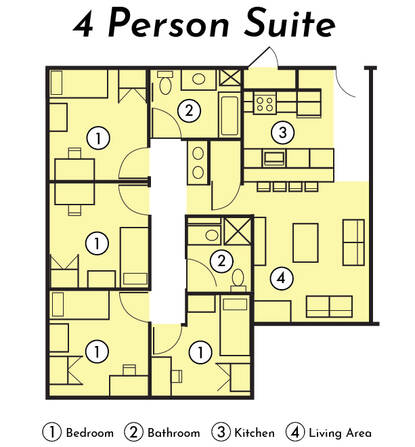
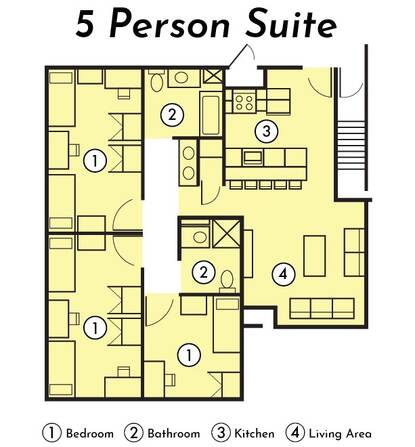
Suite & Room Dimensions
Suites in total are approximately 1,100 square feet
- Single bedrooms are approximately 110 square feet
- D room single bedrooms are approximately 102 square feet
- Double bedrooms are approximately 165 square feet
Alexander Hall
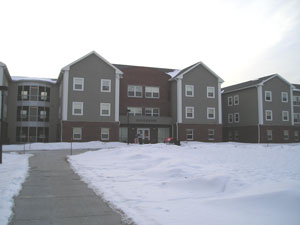
- Housing Style: 12-Month Housing
- Number of Residents: Co-Ed building with 132 residents
- Room Configuration: 33 four-person suites (four single rooms with shared living space, two bathrooms, and kitchen)
MCC's first home — Rochester’s former East High School at 410 Alexander Street — had been condemned by the city as a fire hazard in 1960. However, that did not deter MCC founders who immediately went to work making the necessary renovations. On September 9, 1962, the doors of MCC’s original campus swung open and welcomed 720 students. MCC’s campus spirit was undoubtedly born in this communal, resourceful and informal setting, where collegiality and cooperation first turned the dream of accessible education into a reality for the Rochester community.
Alexander Street was MCC's address for 6 years. In June 1968 the college responded to the increasing enrollment population by opening a new campus in Brighton.
Canal Hall
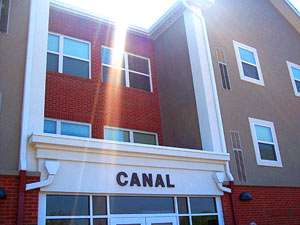
- Housing Style: 10-Month Housing
- Number of Residents: Co-Ed building with 366 residents
- Room Configuration: 70 five person suites (two double bedrooms and one single room, with shared living space, two bathrooms, and kitchen)
The Erie Canal, a 348-mile waterway today, was first completed in 1825. As one of America’s most treasured historical resources and most successful public works project, the Canal played a pivotal role in making New York the Empire State. Boom towns sprung up because this narrow ribbon-of-water trade route linked Buffalo, Rochester, Syracuse, Utica, and Albany with New York City and lowered transportation costs by 90 percent. Once trodden by mule teams, the old canal ran through downtown Rochester. By no means less historically significant, the 20th Century version of the canal runs just beyond the northeast side of the campus and is now a scenic pathway for bicyclists and hikers, part of a recreational network that makes up the Canalway and Greenway Trail.
Pioneer Hall
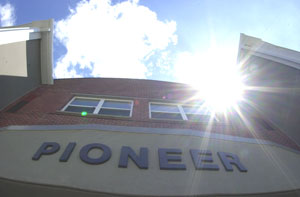
- Housing Style: 10-Month Housing
- Number of Residents: Co-Ed building with 137 residents
- Room Configuration: 28 four person suites (four single rooms with shared living space, two bathrooms, and kitchen), 5 five person suites (two double rooms and one single room with shared living space, two bathrooms, and kitchen)
- Additional amenities: pool table in common area/lounge
Established in 1961 as a unit of the State University of New York, MCC was a vision shared by a handful of prominent local business people, Monroe County Manager Gordon A. Howe and the Monroe County Board of Supervisors. The time was right for Monroe Community College. A publicly funded two-year institution in their own community offered exciting new opportunities for growth.
The first Board of Trustees, a powerhouse of Rochester’s finest in medicine, business, education and law, was appointed by the Board of Supervisors and the Governor of New York. In the early months of 1962, the Board of Trustees hired Dr. Leroy V. Good as MCC’s founding president. Good, a pioneer in successfully establishing community colleges in three other states, would make his mark in Rochester as well.
Tribune Hall
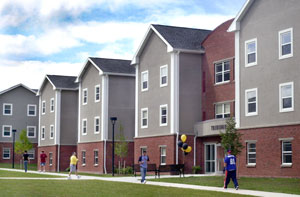
- Housing Style: 10-Month Housing
- Number of Residents: Co-Ed building with 137 residents
- Room Configuration: 28 four person suites (four single rooms with shared living space, two bathrooms, and kitchen), 5 five person suites (two double rooms and one single room with shared living space, two bathrooms, and kitchen)
- Additional amenities: pool table in common area/lounge
Monroe Community College athletic teams are known as the Tribunes. The name "Tribunes" was selected by popular vote among students and faculty members in the early years of the college. The team mascot is derived from the Roman officials who were defenders of the people. The Tribune name has served MCC well. Over the years, the MCC athletic teams have won numerous regional and national championships. MCC is the home of one of the most successful NJCAA athletic programs in the nation. At almost any time of year, you can hear “Go Tribunes” echoing from the physical education complex and the adjacent athletic fields.
About Dr. Alice Holloway Young
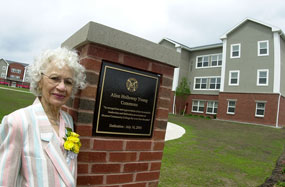
Dr. Alice Holloway Young joined the Rochester City School District in 1952, and was one of the first African-American teachers. Over the next three decades, she taught at the elementary school level, administered entire schools and implemented a variety of district-wide programs that transformed Rochester’s educational character and commitment. Named a Monroe Community College trustee in 1961, Dr. Young helped establish the college and its vision. Her involvement and commitment to Monroe Community College has transcended four decades as a founding trustee, Board Chair and Chair Emerita. Throughout her career, she has received numerous honors. It is most fitting that this trailblazing educator be honored for her years of dedicated and inspiring service to Monroe Community College.
Brighton Campus, West Canal Hall, First Floor
Monday through Friday from 10:00am to 5:00pm
For more information, please call (585) 292-3674 or email residencehalls@monroecc.edu.

